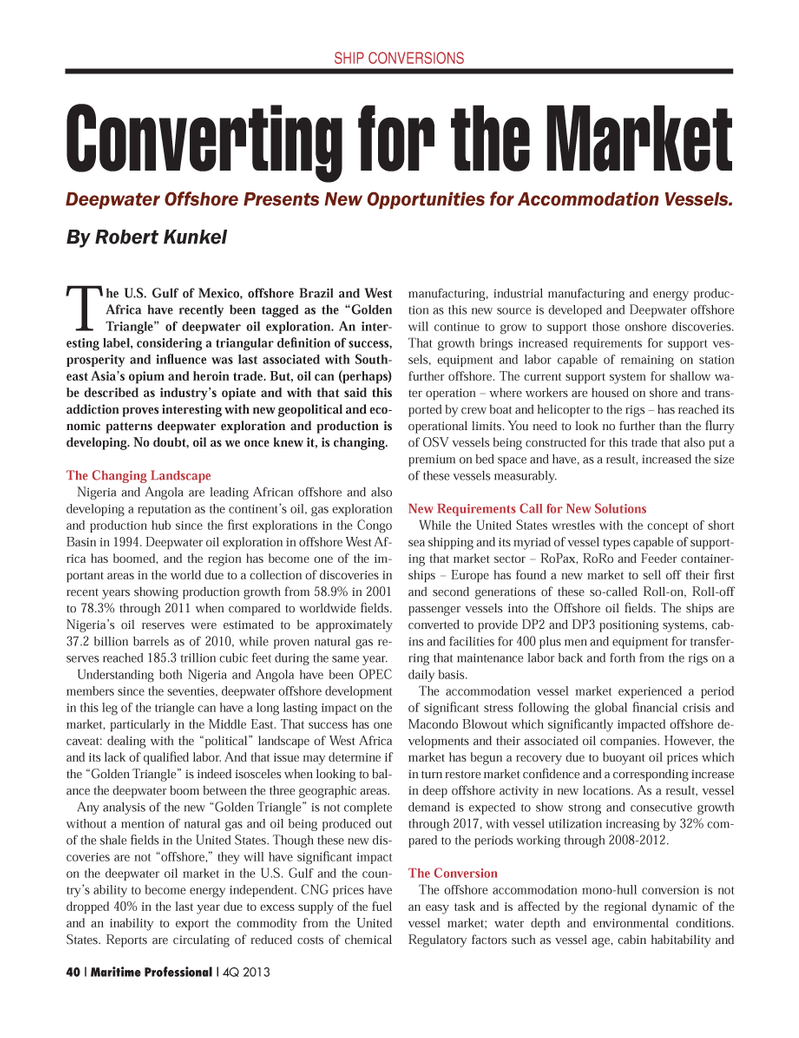
Page 40: of Maritime Logistics Professional Magazine (Q4 2013)
Shipbuilding, Repair
Read this page in Pdf, Flash or Html5 edition of Q4 2013 Maritime Logistics Professional Magazine
The U.S. Gulf of Mexico, offshore Brazil and West Africa have recently been tagged as the ?Golden Triangle? of deepwater oil exploration. An inter- esting label, considering a triangular de nition of success, prosperity and in uence was last associated with South- east Asia?s opium and heroin trade. But, oil can (perhaps) be described as industry?s opiate and with that said this addiction proves interesting with new geopolitical and eco- nomic patterns deepwater exploration and production is developing. No doubt, oil as we once knew it, is changing. The Changing LandscapeNigeria and Angola are leading African offshore and also dev eloping a reputation as the continent?s oil, gas exploration and production hub since the rst explorations in the Congo Basin in 1994. Deepwater oil exploration in offshore West Af- rica has boomed, and the region has become one of the im- portant areas in the world due to a collection of discoveries in recent years showing production growth from 58.9% in 2001 to 78.3% through 2011 when compared to worldwide elds. Nigeria?s oil reserves were estimated to be approximately 37.2 billion barrels as of 2010, while proven natural gas re- serves reached 185.3 trillion cubic feet during the same year. Understanding both Nigeria and Angola have been OPEC members since the seventies, deepwater offshore development in this leg of the triangle can have a long lasting impact on the market, particularly in the Middle East. That success has one caveat: dealing with the ?political? landscape of West Africa and its lack of quali ed labor. And that issue may determine if the ?Golden Triangle? is indeed isosceles when looking to bal- ance the deepwater boom between the three geographic areas. Any analysis of the new ?Golden Triangle? is not complete without a mention of natural gas and oil being produced out of the shale elds in the United States. Though these new dis- coveries are not ?offshore,? they will have signi cant impact on the deepwater oil market in the U.S. Gulf and the coun- try?s ability to become energy independent. CNG prices have dropped 40% in the last year due to excess supply of the fuel and an inability to export the commodity from the United States. Reports are circulating of reduced costs of chemical manufacturing, industrial manufacturing and energy produc- tion as this new source is developed and Deepwater offshore will continue to grow to support those onshore discoveries. That growth brings increased requirements for support ves- sels, equipment and labor capable of remaining on station further offshore. The current support system for shallow wa- ter operation ? where workers are housed on shore and trans- ported by crew boat and helicopter to the rigs ? has reached its operational limits. You need to look no further than the urry of OSV vessels being constructed for this trade that also put a premium on bed space and have, as a result, increased the size of these vessels measurably. New Requirements Call for New Solutions While the United States wrestles with the concept of short sea shipping and its myriad of vessel types capable of support- ing that market sector ? RoPax, RoRo and Feeder container- ships ? Europe has found a new market to sell off their rst and second generations of these so-called Roll-on, Roll-off passenger vessels into the Offshore oil elds. The ships are converted to provide DP2 and DP3 positioning systems, cab- ins and facilities for 400 plus men and equipment for transfer- ring that maintenance labor back and forth from the rigs on a daily basis. The accommodation vessel market experienced a period of signi cant stress following the global nancial crisis and Macondo Blowout which signi cantly impacted offshore de- velopments and their associated oil companies. However, the market has begun a recovery due to buoyant oil prices which in turn restore market con dence and a corresponding increase in deep offshore activity in new locations. As a result, vessel demand is expected to show strong and consecutive growth through 2017, with vessel utilization increasing by 32% com- pared to the periods working through 2008-2012. The Conversion The offshore accommodation mono-hull conversion is not an easy task and is affected by the re gional dynamic of the vessel market; water depth and environmental conditions. Regulatory factors such as vessel age, cabin habitability and 40 | Maritime Professional | 4Q 2013Deepwater Offshore Presents New Opportunities for Accommodation Vessels. By Robert Kunkel Converting for the MarketSHIP CONVERSIONSMP #4 34-49.indd 40MP #4 34-49.indd 4012/11/2013 1:25:52 PM12/11/2013 1:25:52 PM

 39
39

 41
41
